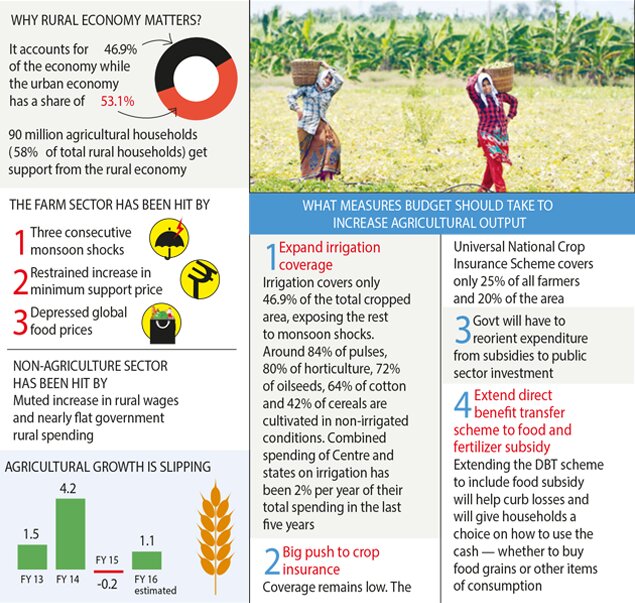Agriculture
Need For MSP Reforms
- 12 Oct 2020
- 7 min read
This article is based on “MSP in the age of surplus” which was published in Indian Express on 12/10/2020. It talks about the need for reforms in the current MSP regime.
Recently, three new farm laws were passed by the parliament to increase the relative role of markets without dismantling the MSP (Minimum Support Prices) system. These laws meet widespread protest from the farming community, especially in Punjab and Haryana.
Fearing the government will do away with the MSP is the bone of contention behind these protests. Farmers want higher and assured income through effective MSP, while the government is offering greater choices to farmers through markets, without demolishing the existing MSP system.
Further, Indian agriculture has, since the Green Revolution, turned the corner from scarcity to surplus. In a surplus agrarian economy, unless a greater role for markets is allowed, the MSP route will continue to drain public exchequer.
Hence, in order to achieve the target of doubling the farmer’s income, there is a need to reform the MSP system, make agriculture demand-driven and invest in agricultural infrastructure.
Need for Reforms in MSP Regime
- MSPs in Favour of Paddy and Wheat: Skewed MSP dominated system of rice and wheat leads to overproduction of these crops. This can be seen in the stocks for wheat and rice with the government are way above the buffer stock norms.
- Further, it discourages farmers to grow other crops and horticulture products, which has higher demand and subsequently can lead to increase in farmers income.
- Economically Unsustainable: The economic cost of procured rice comes to about Rs 37/kg and that of wheat is around Rs 27/kg. However, market prices of rice and wheat are much lower than the economic cost incurred by the Food Corporation of India (FCI).
- Due to this, the FCI’s economic burden is touching Rs 3 lakh crore.
- This amount eventually will have to be borne by the Union government and may subsequently lead to divergence of funds from being invested in agriculture infrastructure.
- Market-Driven System in the Non-Farm Sector: Milk and poultry don’t have MSP and pricing is done by the company in consultation with milk federations, not by the government.
- Due to this, milk farmers do not have to go through the mandi system paying high commissions, market fees and cess.
- Further, these cooperatives compete with multinational private companies like Nestle, Hatsun which ultimately benefits in augmenting farmers' income.
- Moreover, private companies also invest in rural infrastructure.
- Due to combined effects of these factors, the milk sector has been growing at a rate two to three times higher than rice, wheat and sugarcane.
- Restriction in Exports: Even after producing surplus grains, every year a huge portion of these grains gets rotten. This is due to the restrictions under WTO norms, that grain stocks with the FCI (being heavily subsidized due to MSP) cannot be exported.
Way Forward
- Pursuing Cooperative Federalism: Agriculture is a State subject in the Constitution, listed as Entry 14 in the State List (List II).
- Apart from this, entry 26 in List II refers to “trade and commerce within the State”; entry 27 refers to “production, supply and distribution of goods”; and entry 28 refers to “markets and fairs”.
- For these reasons, intra-State marketing in agriculture was always considered a legislative prerogative of States.
- However, there is a case to argue that the current three farm legislations, have poor legal validity and may weaken federalism.
- Therefore, any reform pertaining to agriculture and farmer’s income must come up after consultation with the states.
- Changing the Pricing Mix: Government must come up with a suitable transition to agricultural pricing policy, whereby partial agricultural pricing should be state-supported and partially market-driven.
- One way to do this, could be a deficiency payments scheme along the lines of the Bhavantar Bhugtan Yojana (BBY) initiated by Madhya Pradesh.
- In this scheme, the government rather than procuring from farmers, compensates farmers with cash transfers when the market price falls below MSP.
- Strengthening FPO: With the changes brought the recent farm legislation, it is expected that many companies will be encouraged to build efficient supply lines somewhat on the lines of milk.
- However, there is a genuine demand for protection of farmers from ruthless market orientation for Profit.
- Thus, there is a need for strengthening of Farmers Producer Organisations (FPOs), this will increase bargaining power of farmers on one hand and provide a suitable investment climate on the other.
Conclusion
Agriculture lies at the backbone of Indian economy. Therefore, more sustainable solutions lie in augmenting productivity, diversifying to high-value crops, and shifting people out of agriculture to the high productivity sector.
|
Drishti Mains Question In an agrarian economy, unless a greater role for markets is allowed, the MSP route will continue to drain public exchequer. Discuss. |
This editorial is based on “Trouble in the air” which was published in The Business Standard on October 8th,2020. Now watch this on our Youtube channel.







